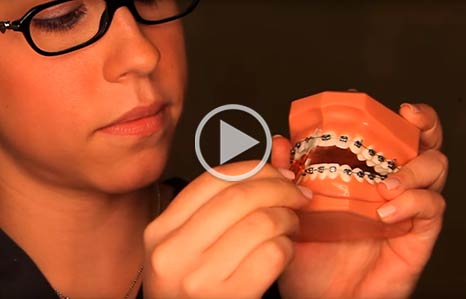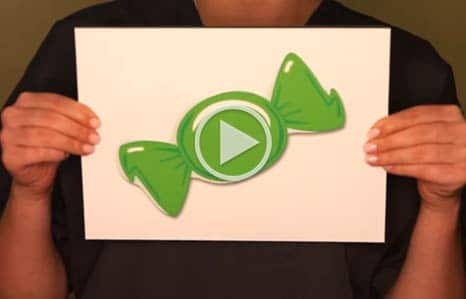Brushing and Flossing
It is more important than ever to brush and floss regularly when you have braces to keep your teeth and gums healthy during orthodontic treatment. Patients who do not keep their teeth clean may require more frequent visits to the dentist for a professional cleaning. Adults who have a history of gum disease should also see a periodontist during orthodontic treatment. Watch the two videos below on the proper care of braces during orthodontic treatment.
Eating with Braces
What can you eat? Let’s talk about what you shouldn’t eat! For the first day or so, stick to soft foods. Avoid tough meats, hard breads, and raw vegetables. Before long, you’ll be able to bite a cucumber again. During orthodontic treatment you will need to avoid certain foods to protect your orthodontic appliances.
Foods to Avoid
- Chewy foods (ex. bagels, hard rolls, licorice)
- Hard/Crunchy foods: (ex. popcorn, hard nuts, ice, hard granola)
- Sticky foods: (ex. caramels, gum, starburst, tootsie rolls, gummies)
- Foods you have to bite into: Please eat these differently by cutting them first (ex. meat on bones like chicken wings, corn on the cob, apples, carrots)
Chewing on hard things (for example, pens, pencils or fingernails) can damage the braces. Damaged braces will cause treatment to take longer.
General Soreness
When you get your braces on, you may feel some general soreness in your mouth and the teeth may be tender to biting pressure for 3 – 5 days. Take ibuprofen (Motrin or Advil) as it tends to work better than Tylenol for teeth discomfort due to its anti-inflammatory effects. The lips, cheeks and tongue may also become irritated for one to two weeks as they toughen and become accustomed to the braces. We will supply wax to put on the braces in the irritated areas to lessen the discomfort.
Loosening of Teeth
This is to be expected throughout treatment. Don’t worry! It’s normal. Teeth must loosen first so they can move. The teeth will firm up in their new — corrected — positions after treatment is completed.
Loose Wire or Band
Don’t be alarmed if a wire or band comes loose. This happens occasionally. If a wire sticks out and is irritating, use a blunt instrument (eraser end of a pencil) and carefully, push the irritating wire back under the archwire. Simply get it out of the way. If irritation to the lips or mouth continues, place wax or a wet cotton on the wire to reduce the annoyance. Call our office as soon as possible to set up an appointment to have the problem resolved.
Rubber Band Wear
To successfully complete orthodontic treatment, the patient must work together with the orthodontist. The teeth and jaws can only move toward their corrected positions if the patient consistently wears the rubber bands or other appliances as prescribed. Lack of cooperation following instructions and damaged appliances lengthen the treatment time… so please … follow instructions.
Athletics
If you play sports, it’s important to let us know. A protective mouthguard will be provided for playing contact sports.

